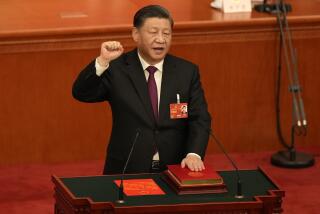Li Xiannian, Ex-President of China, Dies at 83 : Old Guard: He was one of a ruling clique of ‘8 elders’ who ordered the army to repress the pro-democracy movement in 1989.
- Share via
BEIJING — Former President Li Xiannian, one of China’s most powerful hard-line leaders, has died, the government announced Monday. Li is the first to die among the ruling clique of octogenarian leaders, headed by Deng Xiaoping, that ordered the Chinese army to crush pro-democracy demonstrations that engulfed Beijing three years ago.
He died Sunday of an undisclosed illness at the age of 83, the official New China News Agency said.
After the 1989 Beijing massacre, it was clear that Li and the others within the small group of veteran revolutionaries--informally dubbed the “Eight Elders”--were determined to retain supreme power despite the formal retirement of most of their number. Even the official media praised the decisive role of “veteran revolutionaries of the older generation” in crushing the pro-democracy protests.
In a speech one week before the massacre, Li declared that “the sacred mission of the Chinese People’s Liberation Army to stop the turmoil, maintain social stability in the capital and protect the interests of the people in the capital . . . is entirely necessary.” He also declared that insufficient attention had been given to fighting “bourgeois liberalization”--a code word for Western democratic influences.
An official obituary issued Monday praised Li as “a great proletarian revolutionary, statesman and strategist, a firm Marxist and an outstanding party and state leader.”
Li, who was China’s president from 1983 to 1988, played a key role in supporting Deng’s 1978 rise to power and the launching of economic reforms. From the mid-1980s, however, Li was a leading advocate of a slower and more cautious pace of reform, while Deng sought to push market-oriented reforms faster and deeper.
At the time of his death, Li was chairman of the Chinese People’s Political Consultative Conference, an advisory body with no formal powers. Li never adopted the practice of wearing Western suits, instead favoring high-collared Mao jackets. He also frequently wore dark glasses and traditional cloth shoes.
Early this year, after Li and several other hard-line octogenarian leaders fell into ill health, Deng, 87, launched a new attempt to accelerate the pace of economic reforms. Li’s passing may further strengthen Deng’s hand.
Li’s political skills were marked by his unmatched record as a member of the Communist Party Politburo from 1956 to 1987. He survived as a top leader not only during the 1966-1976 Cultural Revolution but also in subsequent years when that tumultuous period was repudiated.
Capable of being outspoken on various topics, Li was one of the government’s top economic experts. “I have always dealt with finances and the economy, and that is an awful job in this country,” Li bluntly told a Yugoslav visitor in the mid-1970s.
Born in central China’s Hubei province, Li trained as a carpenter’s apprentice, then helped lead a local peasants’ uprising and joined the Communist Party in 1927. He fought regional warlords, then the Nationalist government, later the Japanese in World War II and finally the Nationalists again. He headed a band of guerrillas--and was wounded twice--during the Communists’ epic 1934-35 Long March, a 6,000-mile strategic retreat to northwest China that laid the basis for the party’s ultimate victory.
By the time the Communists took power in 1949, Li was a top general. He was then appointed governor of his native province. He served as a vice premier from 1954 to 1980, also working as minister of finance for much of that period.
As China’s president, Li made an official U.S. tour in 1985.
At a Los Angeles banquet hosted by pro-Beijing ethnic Chinese organizations, Li sought support from Chinese-Americans for China’s modernization drive and its efforts to reunite Nationalist-ruled Taiwan with the Chinese mainland.
“The (1984) Olympic Games in Los Angeles not only left us with medals, symbols of glory,” Li declared, “but also demonstrated the cohesion of the Chinese nation which has closely bound us, the descendants of the Yellow Emperor (the mythical founder of the Chinese state), in a concerted effort for the rejuvenation and the reunification of our motherland.”
Li was known to be seriously ill, despite government denials, since late last year. He looked older than his official age, and it is very possible that he actually was 86 or 87 at the time of his death. Before he became China’s president, it was believed in the West that Li had been born in 1905, but official biographies released in 1983 called him four years younger. Diplomats said then that the Chinese leadership may have decided to trim his official age to make him seem more youthful.
More to Read
Sign up for Essential California
The most important California stories and recommendations in your inbox every morning.
You may occasionally receive promotional content from the Los Angeles Times.













